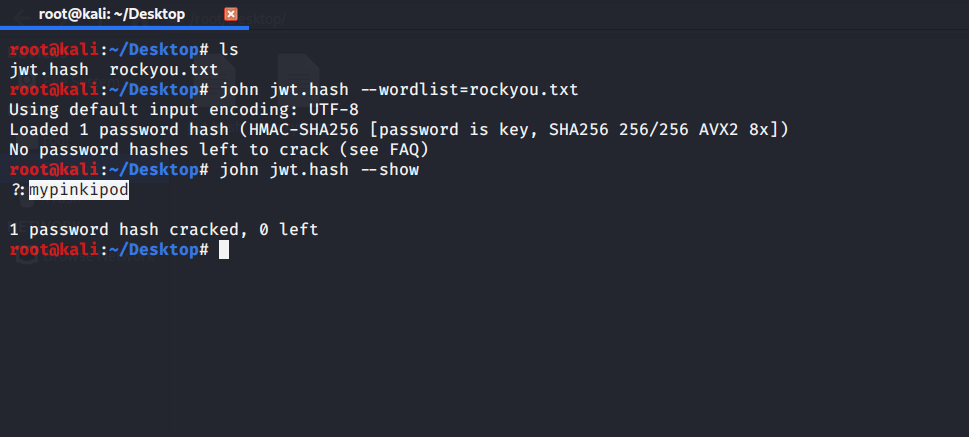Secretkey: Backend server secret key. Use the method above to generate it. Firstsuperuser: The first superuser generated, with it you will be able to create more users, etc. By default, based on the domain. Firstsuperuserpassword: First superuser password. Use the method above to generate it. Welcome to PyJWT ¶. PyJWT is a Python library which allows you to encode and decode JSON Web Tokens (JWT). JWT is an open, industry-standard for representing claims securely between two parties. Pre-requisite: Basic knowledge about JSON Web Token (JWT) I will be asuming you have the basic knowledge of JWT and how JWT works. If not, then I suggest reading the linked Geeksforgeeks article. Let’s jump right into the setup. Ofcource, you need python3 installed on your system. Now, follow along with me. On the next step, you will provide the key that you have prepared for the connection. The certificate that are supported are.crt,.perm and.der. Here you need write the description and import the key. The full description on how to generate this public key is available on this blog post: generate a CRT file on windows.
2018-02-16T22:25:45Z

When working with web applications, it is often necessary to generate passwords, tokens or API keys, to be assigned to clients to use as authentication. While there are many sophisticated ways to generate these, in many cases it is perfectly adequate to use sufficiently long and random sequences of characters. The problem is that if you are doing this in Python, there is more than one way to generate random strings, and it isn't always clear which way is the best and most secure.
You would think that adding yet one more method to generate random strings would confuse things even more, but unlike all the other options, the new secrets module introduced in Python 3.6 is actually designed for this specific use case, so from my part it is a welcome addition to the Python standard library. In this short article I'm going to give you an overview of this new module.
Generate Jwt Secret Key Python Online
Generating Tokens
Generate Jwt Secret Key Python Programming
The secrets module is part of the Python standard library in Python 3.6 and newer. You can import this module into your application or into a Python shell as follows:
At the core of this module there are three functions that generate random tokens using the best random number generator provided by your system. The first function generates binary sequences of random bytes:
Invoking the token_bytes() function without any arguments returns a token with a default length that is determined to be sufficiently safe and secure. You can also pass the desired length as an argument, as you can see in the second example above.
The token_hex() function works in a similar way, but returns a string with the bytes rendered in hexadecimal notation instead of a raw binary string:
With this function, each byte in the sequence is rendered as two hexadecimal digits, so in the second example above, where I request a token with 20 characters, the resulting string is going to be 40 characters long.
The third function in this group is token_urlsafe(), which returns the random string encoded in base64 format:
The base64 encoding is more efficient than hexadecimal. In the example above you can see that when I requested a token of 20 characters, the resulting base64 encoded string is 27 characters long.
How to know when to use each of these functions? For most cases, the token_urlsafe() function is probably the best option, so start from that one. If you prefer random strings encoded in hexadecimal notation (which will give you only characters in the 0-9 and a-f ranges) then use token_hex(). Finally, if you prefer a raw binary string, without any encodings, then use token_bytes().
There are many use cases that benefit from have a simple and secure way to generate tokens. Here are a few examples:
- API keys that are given to clients after they authenticate with username and password
- Password reset tokens to be sent to the user by email
- Initial passwords for new accounts (you will likely want users to change their password after the first login)
- IDs for background tasks or other asynchronous operations
- Passwords to assign to other services such as databases, message queues, etc.
- Dynamically created unique URLs
Generating Random Numbers
While the token generation functions I described in the previous section are the most useful, the secrets module also provides a few functions that deal with random numbers.
The choice() function returns a randomly selected item from the list provided as an argument:
This function can be combined with a list comprehension to generate random strings that only use a specific set of characters. For example, if you want to generate a random string of 20 characters that only uses the letters abcd you can do so as follows:
The randbelow() function generates a random integer number between 0 and the number given as an argument (not including this number):
Finally, the randbits() function returns an random integer number that has the specified number of bits:
Conclusion
I hope you found this little article useful. I find the token generation functions, and in particular token_urlsafe(), very convenient and keep discovering new uses for it. Are you using these functions for an original purpose I have not described in this article? Let me know below in the comments!
Hello, and thank you for visiting my blog! If you enjoyed this article, please consider supporting my work on this blog on Patreon!
9 comments
#1Eddy van den Aker said 2018-04-20T10:12:29Z
#2Miguel Grinberg said 2018-04-22T06:49:12Z
#3Chinmay Prabhudesai said 2019-01-08T00:06:52Z
#4Miguel Grinberg said 2019-01-08T10:32:19Z
#5Abhi said 2019-02-12T18:29:07Z
#6Fergus said 2020-04-12T10:21:43Z
#7Miguel Grinberg said 2020-04-12T10:27:49Z
#8Rafael Ribeiro said 2020-05-11T03:08:36Z
#9Firas Fatnassi said 2020-05-24T10:44:46Z